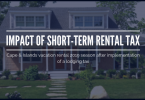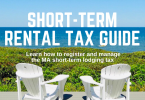The passage of the controversial lodging tax in Massachusetts has certainly made for a challenging year for rental homeowners. In addition to meeting registration and insurance requirements and having to collect and remit the tax, many homeowners were very anxious about the negative impact of the tax on their bookings this past summer and are anxious about the year ahead.
Massachusetts is not alone
Keep in mind that Massachusetts was the last state in the Northeast to impose a lodging tax on short-term rentals, although most nearby states’ rates are not as high. At least 40 states now have a short-term lodging tax, and vacationers will soon come to accept – and even expect – the tax.

Vacation rental lodging tax by state
Setting your rental rates
Remember that, while some vacationers experienced sticker shock at the sudden tax this past year, they soon realize that they will have to pay this tax no matter which rental home they choose.
Here’s our advice about setting your prices
Don’t
- Reduce your rates, especially this early in the booking season.
- Increase your rates, unless you had an easy time renting this past summer despite the tax or you are adding new amenities, such as air conditioning.
- Incorporate the lodging tax in your posted rental rates. Almost all of your competition is not including the tax in their rental rates. So when vacationers compare listings by price (in addition to location, size, and amenities), yours would appear more expensive.
- Offer to split or pay the tax. It’s better to reduce the rate and have the tenant pay for the tax. A reduced rate will also reduce the tax amount.
Do
- Set your rates and open your calendar in order to take advantage of early-bird vacationers inquiring early for 2020. Even as early as this past August, we found that 70% of inquiries were going to listings with pricing for 2020. Without pricing, your listing will not come up in a search.
- Offer incentives to past guests if they commit early for next year.
- Post an Owner Special with incentives to all prospective renters encouraging them to book early.
Possible tax increase for some towns
If your home is in a town with a local tax of 4%, be aware that there may be a rate increase to a 6%. At least 5 towns have already increased their local tax since the law was passed in December of 2018. In addition, the Vineyard and Nantucket may join the Water Protection Fund, which would mean an additional 2.75% tax.
Keep in mind that the tax is determined by the date of occupancy, not the date when the lease was signed. So if your rental home is in one of the towns that faces the possibility of a tax increase, we recommend that you add the following clause to your lease:
*According to the MA Department of Revenue, the tax rate is determined as of the date of occupancy. If a rate increase occurs, Tenant is responsible for any additional amounts due after this contract is signed.
Read more about Protecting yourself from a possible tax increase.
Vacationers will adapt
Despite the fact that there will be no exemptions from the tax as there were this year (if leases were signed prior to 1/1/19 or for rentals prior to July 1), the trend continues wherein early planners are starting earlier than ever. Perhaps this indicates that discerning vacationers are anxious to get the right home at the right price.
Vacationers are savvy shoppers and realize they can book directly with homeowners on WeNeedaVacation.com and thus avoid the 5-20% booking fees that major sites like Airbnb, HomeAway and VRBO charge.
You can be successful
Despite the tax, the Cape and Islands remain one of the most popular vacation destinations in the country. Vacationers will adjust to this “new normal.”








Hi Joan! My husband and I own a Brewster home which we rent out much of the summer. We have being using VRBO but their prices keep going up for owners and guests. We want to switch to your site. I have 3 questions-
1. Do you collect and remit the Lodging Tax or will it be our responsibility?
2. Does We Need a Vacation provide additional home insurance such as VRBO does?
3. Are there any other hidden fees that I may be missing other than the owner charge for posting on your sight?
Thank you very much!
Sue Meyer
Hi Sue! Brewster is one of my favorite towns on the Cape, and more importantly, it’s popular with vacationers! In answer to your questions, there are no other fees for homeowners besides the subscription fee, nor do we charge vacationers a service fee. Homeowners are responsible for collecting and remitting the tax, but we can guide you through this. Insurance is a more involved subject, so I’d love to speak with you about it. Feel free to call any time (781-239-1469) or email joan@weneedavacation.com.
Dear Joan
Is it true that if you rent for over 31 days you don’t pay the tax?
We are renting now after selling our properties.
Hi Barbara,
Yes, it’s true. If you rent for 31+ days, it’s no longer considered a short-term rental, thus no tax is imposed. Hope you are well!